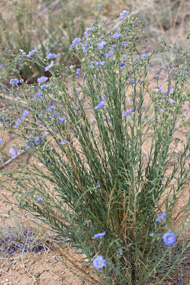Food:
"Wild flax seeds are very rich in oil. They were gathered by some tribes, dried, roasted and ground into flour or meal. The seeds were also cooked with other foods as an oil-rich supplement." (Kershaw 150)
Recipe: Raw Pumpkin Pie with Flax and Nut Crust
"Place 1 cup raw almonds or cashews (or a combination) and 1 cup fat juicy raisins or dates (or a combination) in a food processor fitted with the metal blade. Blend briefly; add 1/4 cup flax seeds and 1/2 teaspoon cinnamon. Blend very well, until all ingredients are finely chopped and begin to stick together like dough. Remove from food processor and press evenly into a pie plate.
Fill with raw pumpkin fie filling or raw fruit filling of your choice." (Morgan 153)
Medicine:
" The crushed seeds were applied to rashes and boils. Flax seeds contain 'healthy' oils, with both alpha-linoleic and sis-linoleic essential fatty acids. These have been shown to lower blood fat (lipid) and cholesterol levels, increase the local immune function of prostaglandin, and reduce clotting. Flax seed oil has been used to treat a wide range of ailments, ranging from breast and colon cancer to lupus-related kidney disease, psoriasis and eczema. The seeds are a good source of dietary fiber and also produce a sticky, glue-like substance (mucilage) when soaked in water for 20 minutes or more. Crushed flax seed is taken internally as a mild laxative with soothing effects on mucous membranes. Flax seed has also been applied externally to soothe and heal burns and boils. The leaves were boiled to make a medicinal tea for treating heartburn." (Kershaw 150)
"Nearly everyone's grandmother could have told you that a linseed poultice was good for any kind of inflammation, and the people of Spanish descent here (New Mexico) still employ it for that purpose. They also grind the dry seeds, mix one teaspoonful of this power with two teaspoonsful of corn meal, and add sufficient boiling water to produce a paste. It is bandaged two or three time a day on infected wounds, and applied to reduce swellings and mumps. A similar treatment is given for boils and sore throat, and, if this is not effective, the ground linasa alone is mixed with a little water or vinegar and poulticed on the soreness." (Moore 99)
"Flaxseed oil, also known as linseed oil, is high in alpha-linolenic acid, an essential fatty acid. ... Crushed flaxseed is also marketed as a dietary bulking agent for constipation based on the water-absorbing properties of its mucilage content. Native Americans used the pleasant-tasting, nutritious seeds to add oil and protein to their diet." (Finley and Nieland 167)
Other Uses:
"Fiber from flax, known as linen (from the greek linon), has been an important source of cordage and textiles since ancient times in the Middle East and North Africa." (Finley and Nieland 167)
"The stems contain long, tough fibers (similar to those found in common flax) that were used in thread, cords and strings for making fishing lines and nets, snowshoes and some parts of mats and baskets. Common flax is cultivated for its fiber, winch is used to make linen. Flowering plants were sometimes boiled to make a wash for the face and head, because the wash was believed to produce beautiful skin and hair." (Kershaw 150)
"Flaxseed oil, ... In addition to its use in dietary supplements, linseed oil is used in paint, ink, and varnish. .... Even more important than the food value were the strong, flexible fibers of the stems, which were used to make string, ropes and fishing lines. Native Americans boiled the roots to obtain a shampoo. They also made and infusion of the flowers, leaves, and stems and use it to wash their skin. This infusion was particularly popular among young, girls, who thought it gave them a pretty complexion. Older people concerned about losing their hair shampooed with the whole plant. The Navajo applied warm, cooked leaves to goiters and other swollen areas, and they used the plant to treat burns." (Finley and Nieland 167)
